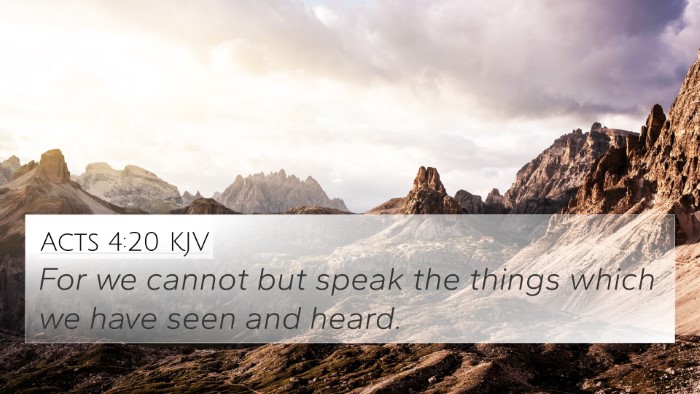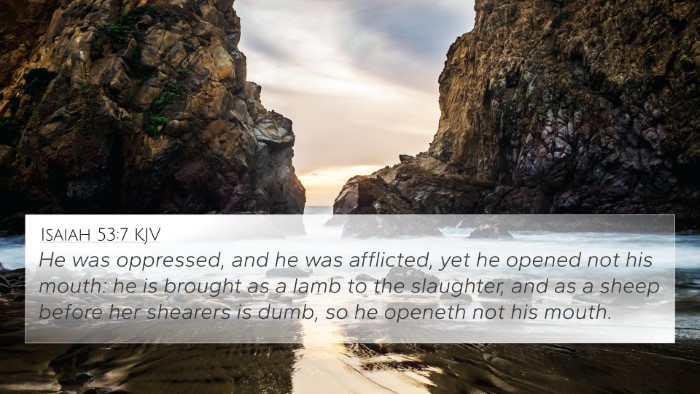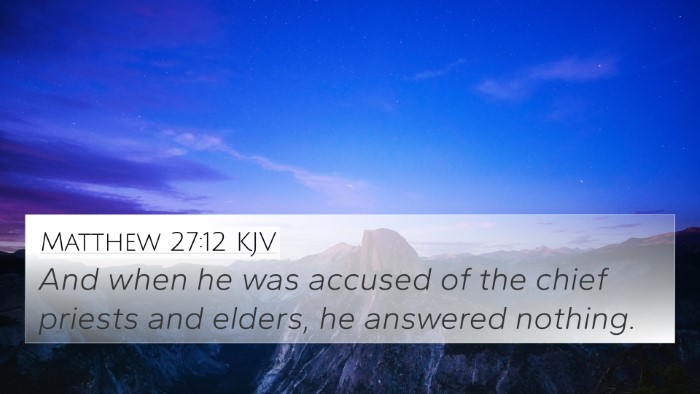Psalms 39:2 - Comprehensive Analysis
Psalms 39:2 states: "I was mute with silence, I held my peace even from good; and my sorrow was stirred." This verse reflects a profound moment of introspection, where the psalmist grapples with the weight of his emotions and the struggle of expressing them. In this analysis, we draw insights from various public domain commentaries to elucidate the meaning, context, and thematic elements present in this verse.
Verse Explanation
The psalmist, traditionally understood to be David, conveys through this verse a dichotomy of being both silent and sorrowful. He chooses to refrain from speaking, even refraining from proclaiming good, which amplifies his internal turmoil.
- Matthew Henry: Henry interprets this verse by emphasizing the psalmist’s choice of silence as a means to cope with sorrow. He notes that sometimes, we must hold our peace rather than speak words that may not properly represent our feelings.
- Albert Barnes: Barnes points out that the psalmist’s silence is not necessarily a lack of thought or feeling but rather a deep and painful reflection. He illustrates the struggle of wanting to express oneself in moments of despair.
- Adam Clarke: Clarke highlights the complexity of the psalmist’s emotions. He discusses the idea that silence can often be a stronger expression of sorrow than words, illustrating the weight carried within the heart.
Thematic Connections
In examining Psalms 39:2, we observe significant thematic connections with other scriptures. These connections offer a deeper understanding of the emotional and spiritual landscape illustrated in this verse.
- Psalms 62:1 - "Truly my soul waiteth upon God: from him cometh my salvation." This verse presents a sense of calm and expectation amidst troubles, akin to the silence experienced by the author of Psalms 39.
- Psalms 77:1 - "I cried unto God with my voice, even unto God with my voice; and he gave ear unto me." Here, the contrast between silence and an outpouring of desire for communication with God can be highlighted.
- Job 3:20-23 - The struggle with sorrow is echoed in Job’s lament, illustrating the profound questioning of existence amid suffering.
- Proverbs 17:28 - "Even a fool, when he holdeth his peace, is counted wise: and he that shutteth his lips is esteemed a man of understanding." This illustrates the value of silence, paralleling the sentiments echoing in Psalms 39:2.
- Isaiah 30:15 - "In quietness and in confidence shall be your strength." This principle resonates with the theme of finding strength in moments of silence.
- James 1:19 - "Let every man be swift to hear, slow to speak, slow to wrath." This reinforces the importance of carefully choosing one’s words, especially in times of emotional turmoil.
- Romans 8:26 - "Likewise the Spirit also helpeth our infirmities: for we know not what we should pray for as we ought." This verse connects with the concept of silence in prayer, suggesting that even unspoken sorrows are known to God.
Cross-Referencing the Themes
Engaging in cross-referencing Biblical texts helps to illuminate thematic elements shared across scripture. The emotional weight of silence in Psalms 39:2 finds reflection in various other passages, highlighting the significance behind the human condition when faced with distress.
Insights from Commentaries
- Emotional Expression: Silence as coping strategy (Henry)
- Introspection: Deep personal reflection leading to sorrow (Barnes)
- Human Experience: The struggle of finding the right words in moments of pain (Clarke)
Concluding Thoughts
Psalms 39:2 serves as a profound reminder of the interplay between silence and sorrow. The insights gathered from prominent commentaries enrich our understanding of this verse, emphasizing the significance of introspection during times of distress.
When studying connections between Bible verses, Psalms 39:2 offers a gateway into the wider narratives of sorrow and silence found in scripture. The use of silence can be both a personal tool for reflection and a communal understanding that resonates throughout the Biblical text.
Further Study Suggestions
For those looking to delve deeper into the practice of cross-referencing Bible verses and understanding their interconnectedness, consider the following:
- Utilizing a bible concordance to find related themes.
- Implementing cross-reference study methods for comprehensive understanding.
- Asking questions such as: "What verses are related to Psalms 39:2?"








